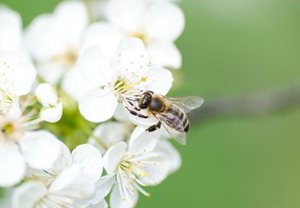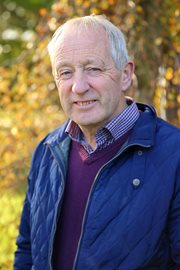An apple orchard in full bloom is one of the most beautiful sights and smells in the countryside, something I look forward to every spring. When orchards are in bloom, growers hope for sunny, frost free weather, so that a good crop of apples can be set for the forthcoming harvest season.
 The Bramley cooking apple, which is the most commonly grown variety in Northern Ireland, has quite unusual genetics in that it is a triploid. This means that in order to produce fruit, Bramley flowers have to be pollinated with pollen from other apple varieties. Consequently, Bramley orchards are interspersed with pollinating varieties such as Golden Delicious, Grenadier and Royal Gala.
The Bramley cooking apple, which is the most commonly grown variety in Northern Ireland, has quite unusual genetics in that it is a triploid. This means that in order to produce fruit, Bramley flowers have to be pollinated with pollen from other apple varieties. Consequently, Bramley orchards are interspersed with pollinating varieties such as Golden Delicious, Grenadier and Royal Gala.
2,000 visits a day
Another very important aspect of the pollination process is the availability of pollinating insects, which include mayflies and bumble bees. To further enhance pollination, many growers will place hives of honey bees in their orchards. When the trees are in bloom the bees will work busily from tree to tree, each visiting up to 2,000 flowers a day. Recent research has also shown that the bees inadvertently switch pollen between them as they brush up against each other in the hive.
As well as the invaluable job of pollination, the honey which the bees make from apple nectar is particularly popular. Next time you buy a one pound jar of honey, just appreciate that it took 1,500 bees their entire life to make it!
Bees are fascinating insects, each one working hard to contribute to the survival of the hive. They are immensely defensive of their queen, honey and colleagues. Several carry out the important task of keeping guard at the entrance to the hive.
They also have a tremendous means of communicating and when they discover a good source of nectar they can point their fellow workers to it by their special ‘figure 8’ dance, wiggling their abdomens in a particular way to indicate how far the nectar is from their hive. Their dance is done at a specific angle to the sun, so that fellow workers can fly off in the correct direction.
For us, just like the humble, hardworking honey bee, being pointed in the right direction is important and sometimes life changing. In the Book of John in the New Testament, we read how the Lord Jesus Christ found His first disciples. Andrew, who had met with Jesus was so convinced of who He was that the ‘…first thing he did was to find his brother Simon and tell him “We have found the Messiah” (that is the Christ). And he brought him to Jesus’ (John 1:41).
Mark’s gospel tells us that when Jesus was in their area, ‘people were bringing little children to Jesus to have Him to place His hands on them…He took the children in His arms, put His hands on them and blessed them’ (Mark 10:13 & 16).
Pointing people to Jesus
Maybe someone has already brought you the Good News of the Gospel and explained how Jesus died for you and what this means. By repenting of your sin and trusting Him as your personal Saviour, you have assurance of eternal life with Jesus in heaven.
While the bees excitedly tell their friends about finding nectar, pointing them in the right direction, what better, more important news than the gospel could you share with your family and friends?
 David Johnston is married to Pauline and they have four grown up children. Since retiring from AFBI Loughgall, he grows Bramley apples which he supplies to local processors and packers. David is a member of Loughgall Presbyterian Church.
David Johnston is married to Pauline and they have four grown up children. Since retiring from AFBI Loughgall, he grows Bramley apples which he supplies to local processors and packers. David is a member of Loughgall Presbyterian Church.
His blog appeared in today’s Farming Life, a fortnightly column entitled ‘Good News for the Countryside’, where people from a farming background, or who have a heart for the countryside, offer a personal reflection on faith and rural life.
You can look at other blogs in this series here.
If you would like to talk to someone about any of the issues raised in this article, please email Rev Kenny Hanna, PCI’s Rural Chaplain at ruralchaplain@presbyterianireland.org or call him on 07938 488 372.